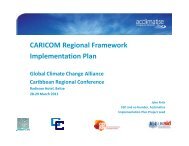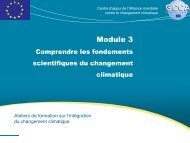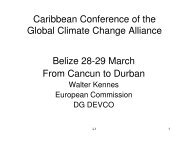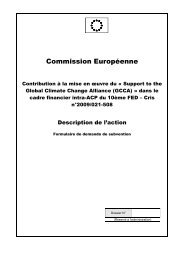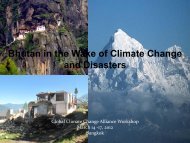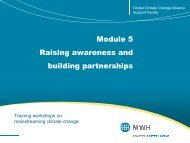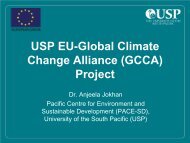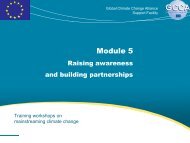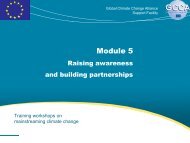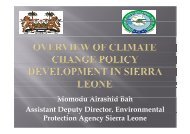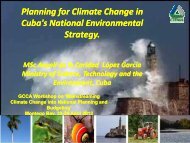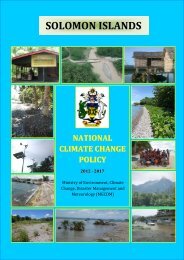Chapter 6Data collectionand researchMonitoring andEvaluationPolicy makingImplementationProgrammedesign andplanningFigure 18: Ongoing process for implementation of climate resilience and low carbon development6.1 Big WinsAmongst all the recommended actions in the <strong>Strategy</strong>, there are a few ‘big wins’ that, ifimplemented, will make a significant impact on mitigation, adaptation and low carbon economicdevelopment. These are likely to produce the greatest return on investment for <strong>Rwanda</strong> as they impact thewhole economy in the long term. More details regarding each ‘big win’ are found in the Sector WorkingPapers in Appendix B. They have been split into low carbon development/mitigation and resilience/adaptation, though there are synergies between them. As the three largest sources of GHG emissions,agriculture, energy and transport are all addressed in the mitigation ‘big wins’, which will enable low carbondevelopment, increase food and energy security and reduce vulnerability to oil price spikes. They would allqualify for climate finance.Low Carbon Development / Mitigation1. Geothermal power generation: Geothermal power is a clean, renewable, reliable and large-scaleenergy resource. There is an estimated potential of up to 700MW of geothermal power in <strong>Rwanda</strong>and this would exceed domestic electricity demand by 2020 if implemented. It uses knowntechnology and could produce electricity at four times less the cost of diesel generated electricitycurrently in use in <strong>Rwanda</strong>. It could replace oil-fuelled power plants which currently supply 38MWof electricity and result in high GHG emissions and are vulnerable to oil price spikes. Geothermalpower has near zero emissions, making it eligible for carbon credits. It is a domestic resource, notshared with neighbouring countries like methane in Lake Kivu and hydropower on the Rusizi andRusumo Rivers, and has relatively small land use impact, unlike peat. Geothermal energy,together with other renewable energy sources, will provide energy security, reduce energy costsand vulnerability to external economic shocks and ultimately promote economic development.40Government of <strong>Rwanda</strong>
Chapter 62. Integrated soil fertility management: The crop intensification programme in <strong>Rwanda</strong> currentlyuses inorganic fertiliser to increase crop yields. These imported fertilisers produce a significantproportion of <strong>Rwanda</strong>’s GHG emissions through soil nitrous oxide (N2O) emissions but alsothrough the fertiliser manufacturing process and transportation. Demand for inorganic fertiliserscan be reduced by applying an integrated approach to soil fertility and nutrient management,which employs agroecology, resource recovery and reuse, and fertiliser enriched composts. Anintegrated approach will significantly lower inorganic fertiliser demand, reduce dependence on oil,reduce GHG emissions and increase farm profitability due to reduced input costs for farmers. Thiswill contribute to reducing vulnerability to external shocks. Such approaches also improve soilstructure and the water retention capacity of soils, leading to climate resilient agriculturalecosystems and sustainable food security.3. High density walkable cities: The growing population and increasing urbanisation will result in anincrease in urban area in <strong>Rwanda</strong>. If this is not achieved in a high density manner, <strong>Rwanda</strong> willface unprecedented levels of urban sprawl, partly due to hilly terrain. This forces people to travelgreater distances than necessary, with motorised transport resulting in GHG emissions and airpollution. Designing high density cities with corridors for pedestrians and cyclists and green publicspaces, would reduce the need for energy intensive transport, improve quality of life and reducethe risk of flooding. Not only will this reduce GHG emissions and oil dependency, but also reducethe burden of transport costs to citizens. It also has adaptation benefits, as reduced urban sprawllimits the development of housing on steep slopes which are vulnerable to flooding andlandslides.<strong>Climate</strong> Resilience / AdaptationChapter 6: Roadmap to Implementation1. Irrigation infrastructure: <strong>Rwanda</strong> has high annual rainfall which it has traditionally been able toexploit for seasonal agriculture. However, seasonal agriculture is vulnerable to climate change andpopulation pressure, as even slight changes in rainfall patterns can have significant impacts oncrop and livestock production. The uncertainty in the timing of wet seasons makes it difficult forfarmers to know when to plant and to harvest to produce a good crop. Irrigation infrastructuregives farmers more control of the water resource and reduces the vulnerability to changing rainfallpatterns. It also allows for diversification of crops, such as rice, contributes to efficient land andwater usage, and provides water to dry areas. Irrigation infrastructure forms a crucial componentof Integrated Water Resource Management as improved watershed management allows forincreased water supply and efficiency in other sectors, while also reducing disaster risks throughthe mitigation of floods and landslides.2. Robust road network: <strong>Rwanda</strong>, at 0.56km/km 2 has one of the densest road networks in Africa.As the dominant mode of transportation, all sectors – agriculture, mining, industry and services –and therefore the economy relies on this road network. These roads vary in quality, from tarmachighways to dirt tracks. The poor quality roads have a detrimental effect on the economy,contributing to a large proportion of food produce being lost during transit to market. The majorityof the network is unprepared for current weather events, let alone future variations due to climatechange, making the entire economy vulnerable to flooding and storms. Building and maintainingthe roads in a way that is not only suitable for the value of the route, but also resilient to moreextreme weather events, will reduce <strong>Rwanda</strong>’s vulnerability and promote economic development,particularly in rural areas.National <strong>Strategy</strong> on <strong>Climate</strong> <strong>Change</strong> and Low Carbon Development 41



